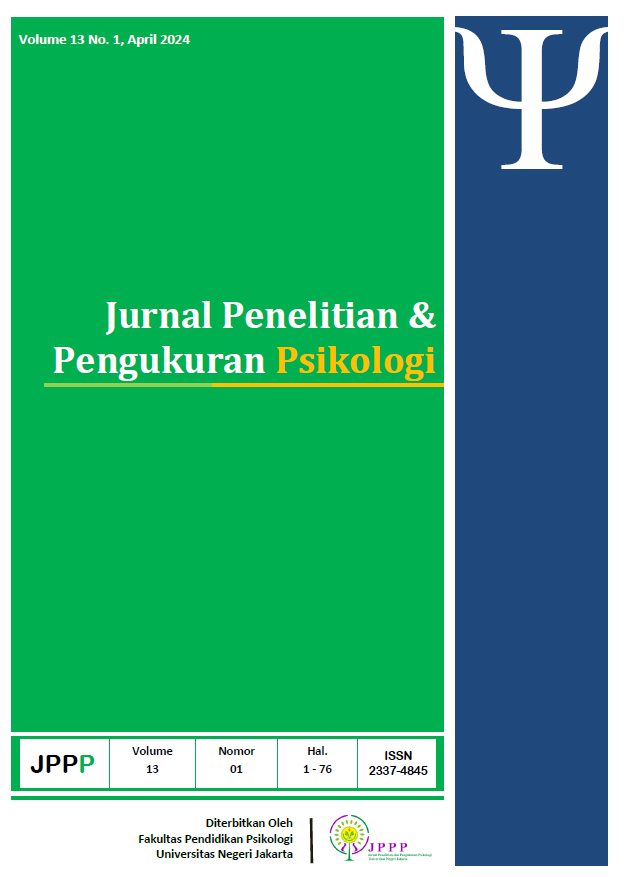Peningkatan Kejujuran Akademik pada Mahasiswa melalui Pelatihan Pendidikan Anti Korupsi
DOI:
https://doi.org/10.21009/JPPP.131.03Keywords:
academic dishonesty, Anti-Corruption Education, studentsAbstract
Students may indeed be seen as not committing acts of corruption at all with state funds, but the violations they commit are irresponsibility for what has been entrusted to them, especially in an academic context. If positioned equally, conditions like this have the potential to cause students to commit the same acts of corruption as public officials. Based on this problem, a special intervention or treatment is needed to improve student academic honesty, one of which is anti-corruption education training. This research aims to see how effective anti-corruption education training is in improving academic honesty in students. The research method used was an experiment with the target subjects being 22 active students of the Psychology Study Program Unjani Yogyakarta. The experimental design used in this research is One Group Pretest Posttest Design, where there is only 1 group of subjects, namely the experimental group. Based on the results of data analysis through the paired sample t test, a significance value of 0.000 was obtained (p < 0.05). This means that there is a very significant difference before and after the anti-corruption education training given to the training participants.
References
Anggraeny, L. (2012). Penerapan metode studi kasus dalam upaya meningkatkan kemampuan berpikir kritis mahasiswa pada mata kuliah hubungan internasional. Media Komunikasi, 11 (1): 1 – 15.
Bintoro, W., Purwanto, E., & Noviyani, D. I. (2013). Hubungan self regulated learning dengan kecurangan akademik mahasiswa. Educational Psychology Journal, 2(1), 57–64.
Falah, F. (2012). Perilaku korup di mata mahasiswa. Prosiding Seminar Nasional Psikologi Islami, 151 – 158.
Heryadi, A., Jayanti, A.M., & Zetta, C.V.E. (2022). Kejujuran akademik mahasiswa dan persepsi anti korupsi. Jurnal Psikologi Konseling, 21 (2): 1418-1430. DOI: https://doi.org/10.24114/konseling.v21i2.41112
Hidayat, A. S. (2019). Pendidikan kampus sebagai media penanaman nilai-nilai antikorupsi bagi mahasiswa. SALAM: Jurnal Sosial dan Budaya Syar-I, 6 (1): 43 – 54. DOI: 10.15408/sjsbs.v6i1.10498
Indriani, D.T. (2019). Bentuk kecurangan akademik di kalangan mahasiswa. Skripsi. Semarang: Fakultas Ilmu Pendidikan Universitas Negeri Semarang. http://lib.unnes.ac.id/34794/1/1511412070_Optimized.pdf
Muhasim. (2017). Budaya kejujuran dalam menghadapi perubahan zaman. Palapa: Jurnal Studi Keislaman dan Ilmu Pendidikan, 5 (1): 174-195.
Putra, M. A. H. (2019). Building Character Education Through The Civilization Nations Children. The Kalimantan Social Studies Journal, 1(1), 12-17.
Shafira, N. N. A. (2015). Penerapan refleksi diri dan self evaluation sebagai keterampilan dasar dalam meningkatkan profesionalisme pada mahasiswa kedokteran. JMJ, 3 (1): 60 – 67.
Tim Penulis. (2020). Modul pendidikan anti korupsi untuk mahasiswa. Jakarta: Sekretariat Jenderal Kementerian Riset, Teknologi dan Pendidikan Tinggi Republik Indonesia.
Utami, N.S., Farid, M., & Ekayati, N.IGAA. (2020). Efektivitas diskusi moral tema kejujuran akademik untuk meningkatkan kejujuran akademik pada remaja. Thesis. Fakultas Psikologi Universitas 17 Agustus 1945.
Westberg, J. (2001). Helping learners become reflective practitioners. Education for health, 14 (2): 313 – 321.
Wibawa, D.S., Agustian, M., & Warmiyati, M.T. (2021). Pendidikan anti korupsi sebagai tindakan preventif perilaku koruptif. Muqoddima, Jurnal Pemikiran dan Riset Sosiologi, 2 (1): 1 – 18. DOI: 10.47776/MJPRS.002.01.01







